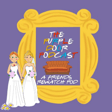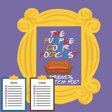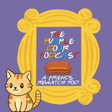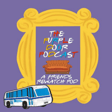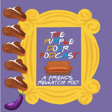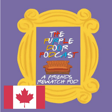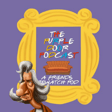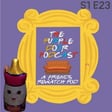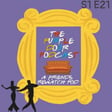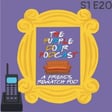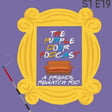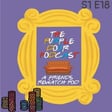Become a Creator today!Start creating today - Share your story with the world!
Start for free
00:00:00
00:00:01

Bowling Bonus! Using Friends to learn Spanish
Justin & Faby Bowling join Alasdair for a small bonus episode discussing the Spanish spoken in Friends!
Recommended
Transcript
Introduction and Guest Appearance
00:00:04
Speaker
Well, welcome aboard to a bonus episode. We are doing a quick extra episode for you guys this week. We're calling it Bonus with the Bowlings, or at least I am, because thought that was a fun name.
00:00:15
Speaker
We are here with Justin and Fabi Bowling, who we have name-dropped before and did appear on our live episodes.
The Role of Language in Translation
00:00:22
Speaker
We've name dropped Fabi in particular for helping us with some Spanish translations, especially regarding the one um the one with two parts, part two.
00:00:32
Speaker
In the closing credits, there's a whole scene that is done in Spanish, and I speak no Spanish whatsoever. Justin speaks pretty good Spanish, and then Fabi is a native Spanish speaker. So I thought it'd be awesome to get the two of them on to discuss this and other linguistical fun things in the episode. That's my big word for the day.
00:00:52
Speaker
Well, thank you guys both for being here. Of course. Absolutely. Alright, so why don't we start off by talking through this closing credit scene. The whole episode was, there was a big running story about the television being in Spanish.
00:01:04
Speaker
And for those of you who don't remember, this final scene was just done all in Spanish. And I didn't understand it, so reached to the Bullings.
Humor and Cultural Differences in Translation
00:01:11
Speaker
And Fabi, why don't you tell us a little bit about what's going on in this scene?
00:01:15
Speaker
um Okay, well, I remember you wanted to see if the translation was accurate. So I gave a little... um You know, I checked it out again since I've been I've been watching this show for like years and years.
00:01:29
Speaker
um But yeah, it was pretty much accurate. The only thing that I we were talking about it last time. ah i never got the joke that Chandler does when they're asking who ordered what for the Chinese food they had.
00:01:47
Speaker
And Monica's like, yeah, what who ordered the General Salt chicken? And he goes, it could have been General Salt. And i was like, what does that even mean? Like, I don't get the joke. And they start laughing. I'm like, what?
00:02:00
Speaker
Confused? but Because in Spanish, it didn't make sense until you put together contextually. Okay, yeah, because I started even reading the English. On the paper, it didn't make sense. Right. Because they they even changed the name instead of General Salt.
00:02:15
Speaker
They say General Tso. Right. And it was a bit confusing. I'm not even an expert on Chinese food. I have never ordered this. so Right. I didn't even have an idea what this was. But ah yeah, when he goes, je oh, it could have been General Tso.
00:02:32
Speaker
I'm like, what does that even mean? and And then I realized he was talking about maybe like a person, like a general from
Translation Challenges and Cultural Insights
00:02:40
Speaker
the army. Right. Right. Saying that he ordered that specific dish.
00:02:45
Speaker
um But yeah, so it was kind of odd. Like he ordered his self-named dish. Right. Exactly. called Chino So's Chicken. Chino So ordered his namesake Chinese dish. Right.
00:02:59
Speaker
And what's funny is I've watched this a million times and I never got that joke. Right. Until, what, like a week ago or maybe less than that? So...
00:03:10
Speaker
It's crazy to think that we got the joke until now. um But yeah, it's pretty much accurate when they talk they're talking about the naked guy playing the hula hoop. It's pretty accurate um until the last, last um comment Ross has when the monkey's taking the remote and he's changing the ah the language or the subtitle, not subtitles, but you know, the language.
00:03:39
Speaker
in the program and it's all in Spanish and they're saying that he took the remote and Ross says he doesn't like the program that's the translation in English but when he's talking in Spanish he's saying that he doesn't like the TV it's not the program but it's the TV so that was the only thing that it was kind of off there but it was pretty much ah Pretty accurate. Pretty accurate.
00:04:11
Speaker
Yeah, now doing this podcast, Deanne and I have talked about it quite a bit. There's things that we've seen a hundred times, but now we're looking at it through a different lens.
Language Learning Experiences and Challenges
00:04:19
Speaker
Yeah. We see things differently. Like, there's an episode we just recorded, and it's got out head which one is, but they make a joke about...
00:04:28
Speaker
And they tell Chandler not to be testosterone-y. And then he says, and then, oh no, somebody said Phoebe says it and Chandler says, that's the real San Francisco treat. I've never understood what that meant.
00:04:39
Speaker
And then Kate had to explain to me there's a product called Rice-A-Roni, which I have heard of. The slogan for that was the real San Francisco treat. And that's where the testosterone sounds like rice-a-rony.
00:04:52
Speaker
Yeah. That is very time-specific. I had no idea. No idea. i thought, well, there's a joke. Now because we're doing this podcast like this, we're stopping and looking at all these things. Therein lies the fun of me being a language learner, h watching a show in another language with English subtitles,
00:05:13
Speaker
It can be tricky. And I'm lucky that I have her cause she's a native speaker because what happens a lot, and especially in languages, are the pragmatics of speech or the colloquialisms or idioms. They just don't
Dubbed Voices vs. Authentic Conversations
00:05:26
Speaker
translate. So a lot of that is like lost on in either language, whichever way you're looking at it.
00:05:31
Speaker
Right. Yeah, I think it's interesting because even I noticed me as a non-Spanish speaker, it sounded a little... static. like when There's a joy that says, hello, but it didn't sound natural at all. There's kind of dubbing. That's a whole other thing. The voice actors are definitely more like...
00:05:51
Speaker
not actors who can emote or hit time or comedy or, or whatever. It's more just like a, hello, I am from a corporate, I'm trying to sell you something. Right.
00:06:02
Speaker
In a very robotic way. Right. Like, La Raza doesn't speak that way. but Like people who speak Spanish would never speak that way. Yeah. Yeah. Yeah. And it just reminds me of those, um, recordings that we used to have when telephones were around. Like, uh, what is it?
00:06:18
Speaker
Um, Movie tone. My first tone. Yeah, the first tone that we have and it was like, okay, leave a message, blah, blah, blah. But the lady that was speaking, that kind of voice, I remember from this part because it was very remote robotic or commercial-like.
Academic vs. Real-world Language Learning
00:06:36
Speaker
and was It's kind of funny. It makes it funnier. That's the home part about it. Cheesy. Yeah, yeah, yeah. and Now, would you say was it could you tell just from this Was it very much more sort of Mexican, Central or South American Spanish as opposed to what I would tell them Spanish? spanish Or is it was there not enough there to tell?
00:06:57
Speaker
would say there is a kind of Latin. Like, I couldn't say if it's Mexican or something like I definitely know it's not Spanish. It's Spanish, like from Spain. the lama It's not Catalan because they don't pronounce the S like T-H. Right, right.
00:07:17
Speaker
So I can definitely say it's not Spanish. Right. But i nobody in Mexico would speak like that. Definitely not. Right. It's just, I don't know. I don't even understand, like,
00:07:31
Speaker
I can't even imagine who would talk like that. Nobody. I can tell you who. Bingo, learning Spanish academically and then trying to hold up conversation in Spanish with a native speaker. Maybe. That's one thing experience when you know meeting your family or becoming a bilingual teacher is all the Spanish I've learned over the years is very academic and that's just not how regular speakers teach so it's like even obviously i look gringo and you know i had to learn i was speaking gringo so like now that i've been with you for several years with your parents i'm learning to speak or sound less gringo yeah less academic i guess suppose you're like just immersing yourself in
00:08:14
Speaker
what real Spanish is and not from a textbook. Yeah, i like a casual conversation. Because there has been many times when he asked me how to say something or he
Language Mishaps and Learning through Entertainment
00:08:24
Speaker
tries to say it and I'm like, okay, nobody would say that.
00:08:27
Speaker
Okay, like if you want to really have a casual conversation with somebody, you wouldn't say that. And then I tell him what to say or what's like ah most commonly used.
00:08:40
Speaker
um But yeah, it's it's just funny sometimes. The the way they ah teach Spanish in schools and in other countries especially, it's just not accurate at all.
00:08:54
Speaker
Right. Yeah. So it is funny. where We have to experiment on that and teaching him. Yeah, have a lot of good fun, funny, and intellectual conversations in that regard.
00:09:06
Speaker
like Right. Down to the very like grammatical or the syntax... ah a sentence it's I find it very fascinating, but it makes for fun conversations. I think that stuff's interesting too. I actually had a conversation yesterday with a first grade teacher who likes to wish, who's an English speaker, but likes to wish our kids happy birthday in Spanish, but mispronounced it.
00:09:29
Speaker
and was saying something very rude and had to be informed by she didn't have the cumpleaños down. It was much flatter, ah which we will discuss off the air.
00:09:40
Speaker
But she had to be corrected by one of the teachers that you're wishing them something very inappropriate. I've definitely been there. Yes. I learned that lesson with your mom, but I don't want to say it on the podcast. Right. It's not very appropriate. We'll save that one for for later. That's how I learned the word. el which is paul right i heard of something different and pronounce or something And it's a bad word. The way that way he was saying it at first, it sounded like he was saying one of those bad words. motherlawter That's awesome. <unk>
00:10:12
Speaker
It's a good icebreaker, right? Yeah. No, we'd been a year and half been at this point. We were already married, but second that's so you i say And I also think I remember with your kids, you would tell him you would tell them,
00:10:27
Speaker
to go charge To go charge their computers. And the way he was saying that word charge in Spanish, it would sound like, you know, going to poop in Spanish. The vulgar version of that.
00:10:43
Speaker
I left out the R. But the kids are kind of chuckling away. i don't know if they ever noticed it because we're transitioning and stuff. So hopefully no one noticed it. I'm sure Daisy might have heard it or Anna walking by somebody and giggled.
00:10:57
Speaker
But no one ever tried to tell she heard me say it. Yeah. That's so funny. That was so funny. I usually get a pass for like just trying, you know, like, oh, oh yeah. She's not speaking accurately or grammatically correct, but like he's trying. But you're trying. making the effort. That's what they care about. I think they're already used to your accent and yeah you're trying to correct me. The kids will correct me because I tell them to correct me.
00:11:19
Speaker
good one of my favorite things coming into your class is that it's a two-way teaching street. Absolutely. Honestly, I learned the most from the the natives because ones that don't speak English because I really have to, like, it forces you to, like, listen and find other ways to communicate through body language and, like, really pick apart and discern the sounds. Right. Yeah, it trains your ear.
00:11:40
Speaker
That's what happened when i was, again, trying to learn English by watching shows. Mm-hmm. The way I learned was, ah well, they streamed those shows in English.
00:11:55
Speaker
Right. Regular voices and all, like ah the... Actors. Actors. But the subtitles
Benefits of Original Language Content
00:12:02
Speaker
were in Spanish. So I was training my ear at the same time i was trying to train my brain to learn the meaning of the words and how to have a casual conversation. So that was pretty fun and it definitely worked.
00:12:15
Speaker
So I was going to ask you about that. If I wanted somebody, again, who only speaks a English, wanted to use Friends or another sitcom to learn Spanish, what's the best way to do it? Yeah, you would always ah get the best results by listening to with a native or... The language you want to learn.
00:12:34
Speaker
with the subtitles of the language you speak. You speak. Right. Exactly. Yeah. um I would say also listening to music helps. I have sort of curated my, i like music that you like.
00:12:48
Speaker
I like rap music a lot. So I've curated like a pretty big, specifically Mexican and hip hop playlist that I listen to every day when I work out. That that helps a lot too.
00:12:59
Speaker
But I will say sometimes even like shows that I know very well, like Friends I'll listen to it in Spanish with the English subtitles. It can be a bit of like the patting the head and rubbing the stomach because there's a lot going on in your brain. You're trying to visually watch what's happening. Right. And read the subtitles and listen and connect the sounds to those words. Right. Right.
00:13:23
Speaker
Yeah, but that the... Sometimes it's exhausting. It is. It's not relaxing, right? It's not always no. It is exciting exhausting, but at the same time, well, practice makes perfect. So you just got to keep going with it. It's helpful to watch a show that you know...
00:13:39
Speaker
Because like like Friends or any other comfort show that you have, you know the dialogue very well. Like by heart, really you only have to listen to it so you know what's happening in the scene. so it frees your brain up a little to focus on listening to sounds ah and my gathering what's happening contextually.
00:13:58
Speaker
right I will say though, we do watch other shows that I've never seen. There's a show called Close the Coitables. um that I don't know very well, but like it still it helps me in a different way.
00:14:11
Speaker
big Well, because this is a show. It's a Mexican show. right It's a series, and it's translated to English. It's Crows Club. It's about soccer.
00:14:23
Speaker
It's about soccer. Anyway, so like the, I get more colloquial and like actually how, you know, even my tongue is tight sometimes.
00:14:34
Speaker
um It does have its benefits as well. To watch something you don't know and like, like a foreign show, not like an English show translated. Right. um That has helped me a lot too. What's the, ah there's a one for a Mexican
Contextual Understanding in Language
00:14:46
Speaker
soap opera?
00:14:48
Speaker
Novela. No, that's what I'm thinking of. fellow no I see them on at the gym sometimes yeah and it's like you can tell it's like not like high quality. yeah It draws you in.
00:14:58
Speaker
yeah You know, you got to know what this guy does in the end, you know, so I've tried watching those sometimes. But of course, I don't what the English is. I'm kind of fun to watch. They they definitely hook you up. I do remember watching one time i was with her mom and she like turkish soap um sometimes so i was we were watching the turkish soap opera opera we in i think was' in turkish i don't know or maybe it was in spanish The subtitles were Spanish, and I think as well as the language was in Spanish. right The audio.
00:15:29
Speaker
And so I had to just go on contextually what what I know of Spanish. right And I actually found it more easy for my brain to sort of hone in and focus on what's happening.
00:15:42
Speaker
um right Because I was like academically or intellectually trying to like, let me read these subtitles. Let me hear what's happening. Let me translate that in my head. All while the continuous conversation is happening. It's... really hard to yeah just remember that off my head. But yeah, i remember doing that one day. was like I kind of figured out what's going on in the show right now. that's how I was asking, asking my mother-in-law what's happening to make sure I was understanding what was happening. Right. yeah It's very important to have context because it gives you a lot of hints, a lot of clues of what's going on.
00:16:11
Speaker
And then you start matching the words that you're listening and reading at the same time. So, yeahs Spanish especially, a very contextual language. We joked about it. Because in Spanish, there's like one word can mean a ton of different things. right Like the word, bell it can mean fart. What's up? Or palo I think it's like hung over a drunk. jump yeah and there's like seven other use just the the right so like it is a contextual that's why you need It's probably i mean like in English, but we just don't think about it because yeah yeah it's a native.
00:16:47
Speaker
That's so interesting. And wanted to say when you were saying that also listening to music helps you with that, it it's totally true because that also helped me a lot. I started learning the intro music in the shows, Friends, Big Bang Theory, Two and a Half Men, all those songs. I learned it.
00:17:05
Speaker
I would go into Google and say, okay, what's the lyrics for this song?
Music as a Tool for Language Learning
00:17:09
Speaker
but So I started reading, understanding, and at the same time learning it, learning the the music and it really helps. So i had any time every time I would watch the show, it was really cool that I could sing the intro music. It was really fun.
00:17:22
Speaker
It was a challenge for me. That's awesome. I think this summer I need to try a few episodes of Friends in Spanish with English subtitles and we'll report back in August. Yes. I'll come in just yakking in Spanish and knock your socks And you have your group of little students that help you with your Spanish lessons. That's right. I'm meeting them in six minutes.
00:17:45
Speaker
That's right. Awesome. I'm going to give you a text at the end of the day. Okay. All right. We're going to go over what you learned today. to make sure you're learning and not forgetting the next step. Well, that's your word for the day. And speaking of words that sound the same, because they like me to call them my school daughters, which I remember is hijas.
00:18:07
Speaker
And then I can't remember how this happened, but i ended up calling myself a potato instead of they wanted to say dad. And I thought they said dad. And I said, I don't know. ah but but Thank you. Okay, there it is. why It's written the same way in Spanish. Papa and Papa. But if you put an accent on the second A, that's when you say dad.
00:18:28
Speaker
um But if it doesn't have an accent, it's potato. We just had this conversation. This is a song I listened to, and one of the lines is este o este. Well, este means this.
00:18:39
Speaker
O means or. So was it this or... this the line or s they or s they also means as they means east. OS, they mean west. Okay. So is it east-west or this or this?
00:18:51
Speaker
I just don't know anymore. There's so many instances of that that have happened. Again, context. You need the context. Well, I look forward to learning some Spanish. Maybe we'll attempt to do an episode in Spanish one day. Kate speaks decent.
00:19:07
Speaker
Oh, really? I can't know. She plays it down She can get by. She can get by. It's pretty impressive. So I'm the odd one out here. I'm going to test her one day. Just go in there and say, yeah, can you smell? But on that note, I did think I'd put you on the spot because we've got to get kids in a second by sending us off with something about friends in Spanish.
00:19:28
Speaker
Just maybe what it means to you when you say something and we won't translate it. We'll just put it out into our Purple Door podcast universe. Okay. So I'll just say in
Conclusion and Language Learning Commitment
00:19:36
Speaker
Spanish. Just in Spanish. Okay.
00:19:48
Speaker
Wonderful. Well, thank you guys very much for joining me today. And we're going to put this on out within the next hour or two. Perfect. But thank you guys so much for joining us here on the Purple Door podcast.
00:19:59
Speaker
Until next time.
00:20:07
Speaker
I'm

